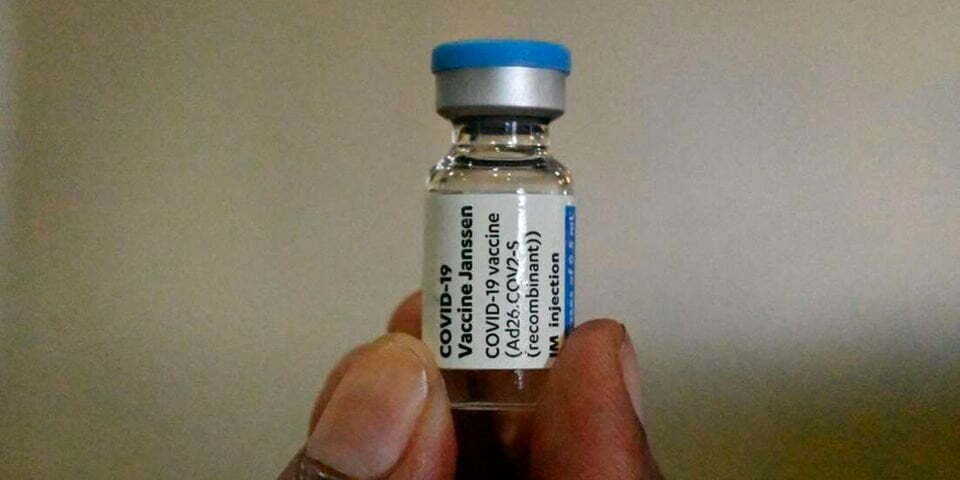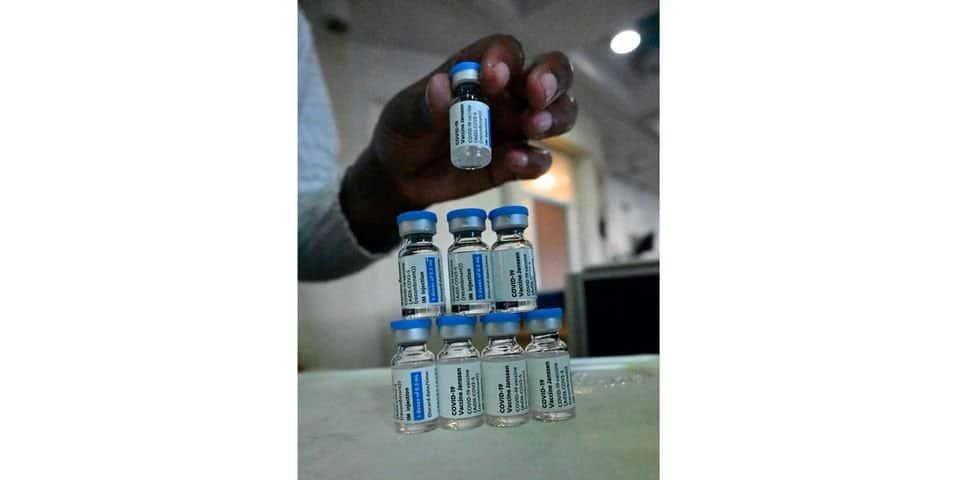Corrupt Ministry of Health officials have established an intricate network of cartels that are selling donated Covid-19 vaccines for as much as between Sh5,000 and Sh6,000 per vial, a Sunday Nation investigation has revealed.
The network specifically targets the single-dose Johnson & Johnson vaccine, which is preferred by most Kenyans who do not want to make a second visit to vaccination centres to get the second dose, as they would were they to get AstraZeneca or Pfizer inoculation.
The Sunday Nation investigation has also discovered that most of the vaccines circulating in the black market are smuggled to Nairobi from government facilities in the north-eastern region. The Ministry of Health has sent thousands of Johnson & Johnson vials to this region because, it reasoned, the lifestyles of the residents and the long distances to vaccination centres would have led to a high second-dose default rate.
Our team of reporters obtained video and photographic evidence of transactions using secret recorders in an investigation that raises questions about government vaccination figures, as every dose that is smuggled from a government facility is recorded as having been administered. The corruption entreprise could also inhibit Kenya’s fight against the Covid-19 pandemic.
The elaborate cartel involves unscrupulous doctors and medical workers who have access to the Ministry of Health Chanjo system, where they key in false data on vaccination figures while sourcing for markets for the vials. At the source, the vaccines are sold for between Sh5,000 and Sh6,000 for vials of AstraZeneca or Johnson & Johnson, while vaccination certificates are sold for as little as Sh1,000. A vial of Johnson & Johnson has five doses and that of AstraZeneca has 12 doses, and these rake in upwards of Sh20,000 in the city.
The Sunday Nation investigation found many sellers offering legitimate documents already registered in the government system. It also encountered sellers in Isiolo and Marsabit who offered 10 vials of the vaccine.
To illustrate how easy it is to corrupt the Chanjo system and get a Covid-19 certificate, three individuals working undercover had their details registered hundreds of kilometers away from the capital city. They all got their certificates within 20 minutes.
However, it is the smuggling of Johnson & Johnson vials from north-eastern to the city that could raise audit questions with the donors. While announcing the distribution of the vaccines to the region earlier in the year, Health Cabinet Secretary Mutahi Kagwe noted that the drug “is easily stored at two to eight degrees Centigrade during administration and can also be frozen at minus 20 degrees to ensure months of shelf-life”.
“It requires fewer logistical and operational costs and is expected to be of great utility in reaching mobile populations and primary healthcare facilities, where uptake of vaccines continues to be low,” he noted.
The Sunday Nation investigation took us 900 kilometres away from the city. Not many people travel to this part of the world, and recent insecurities in Marsabit County have worsened the situation. As we headed to North Horr from Marsabit to meet with our first smuggler, it became apparent that this was also a dangerous assignment.

One of the vials of the Johnson & Johnson Covid-19 vaccine that the Nation bought in Isiolo and Marsabit this week.
“Please don’t go; I’m almost there,” he urged. “I’m on a motorbike and can’t return the vaccines to the hospital since they are aware I was going to vaccinate people.”
After driving for four hours we finally met him at North Horr. He had ridden his motorcycle for two hours and was covered in dust. The vials we had come for were concealed in a paint container full of cold water.
“I had placed them in ice cubes but because of the heat the ice melted,” he explained. “I’m going to buy some ice cubes for you in Marsabit.”
We had requested for 10 vials but he brought six. He explained that the demand was high, and so he had to divide the loot with other regular customers.
“Had you been here yesterday I’d have given you the vials. Now it’s a bit late. Another group came ahead of you. Next time let me know in good time,” he said.
But who is buying these vaccines when the government is offering them free of charge? Indeed, in government and private vaccination centres around the city, and even in select churches and other high-traffic areas, Covid-19 vaccines are easily available at no cost.
Is this a case of people stockpiling them in case there is a shortage, or corrupt officials taking advantage of greedy, ignorant masses? One source told us that the popular Johnson & Johnson vaccine is smuggled from Nairobi and sold to counties that have not received it.
“What happens when the demand is high and the supply is low?” he posed, then answered himself: “People start looking for ways to satisfy the needs of those who need the vaccine. The vaccine is also in high demand in private hospitals in Nairobi and its environs. Most elderly people prefer it because it is a single-shot drug and whenever there is a shortage they are willing to pay for it.”
He said once they sell the vaccine at Sh5,000 per vial, which contains five doses, hospitals and other agents sell the same for between Sh3,000 and Sh5,000 per dose, making as much as Sh20,000 in profit per vial.
Clandestine trade
“Don’t sell these ones below Sh3,000 per dose, at least make money for your time and resources,” advised the source.
From Marsabit we headed to Moyale to pick other vials. At Sololo we met our second source. Dressed in a plain black bui bui, she stood by the road holding a small metallic milk container with the vials inside.
“Here, when you run out of coolers you can always put ice cubes in these containers and the temperature will be maintained,” she explained. She then climbed into our car, placed the vials in a cooler box we had bought in Nairobi for the assignment, took the cash, and quickly left.
The following day we met a third source whom we had missed on the first day at Timau, just a few kilometers past Nanyuki on the road to Isiolo. He brought us three vials because, he explained, he could not get enough names to register on the Ministry of Health vaccination portal.
This clandestine trade in donated vaccines that are distributed free of charge by the government is the new money maker in this part of the country. And it is easy to see why. If 50 people get a Covid-19 vaccination certificate for Johnson & Johnson from the Chanjo system without being vaccinated, 10 vials will be available for sale for Sh50,000. In Nairobi, the gains will be much higher.
Mr Kagwe in March warned private facilities selling vaccines to desist or else the government would take action after concerns emerged that some private hospitals were selling vaccines to Kenyans.
“Let me make it very clear,” he warned, “those carrying out vaccination will have to account for every dose they have used and must be matched against an eligible person. Should there be contrary information we will take whatever legal action possible, even if it means revoking the practising licence.”
But his warnings seem to have fallen on deaf ears, and the trade continues, as this investigation found out.
“Before we remove the vials we have to register people in the Chanjo system to create the impression that they were administered to the general population,” the Timau source told us.
“If I do not have enough names, then I can’t sell the vials. For the next batch I will do an overnight delivery to Nairobi. Just let me know when you want it and I will deliver it. You do not have to come all the way, as long as you pay for my private transportation.”

But why would anyone want to get a Covid-19 certificate without being vaccinated? Jarso Abdi, 60, said he decided to pay for the certificate after he was told by his son in who lives in Nairobi that the jab contained a form of a microchip that the government will use to track and control people.
Beatrice Mwangi, 38, said she opted for the false certificate in August after the government gave civil servants a two-week ultimatum to get vaccinated or risk disciplinary action. She had not been vaccinated earlier because, she claimed, everyone around her got very sick after receiving the jab.
“I have close friends who ended up critically after receiving the vaccine, so that scared me off. When I heard about the fake certificates I paid for one immediately,” she said.
Twenty-nine-year-old Salma Hussein, who also got the certificate, said she has not taken the vaccine because “it was impossible for manufacturers to make effective, safe vaccines in just a year”, and so she does not trust any of the brands.
Marsabit County vaccines logistician Abdu Halaki told the Sunday Nation that not so many people were going for the vaccine yet the doses are available.
“I know we are the last county as far as the uptake of vaccines is concerned, but this is because of several challenges, including insecurity. We are vaccinating around 150 people per day,” he said
Marsabit County has received about 8,740 doses of the AstraZeneca vaccine and 8,100 doses of Johnson & Johnson. It has since vaccinated 3,295 first doses of AstraZeneca and 1,723-second doses. For Johnson and Johnson, 3,423 doses have been utilised.
Mr Halaki said he had not come across anyone selling vaccines, although in the past there had been rumors of theft which were never confirmed.
“If people here are not coming for the free ones can they really buy the vaccines?” he wondered, unaware that his officers were selling the vaccines to other counties.
The Nation is not revealing the identities of the people involved for security and legal reasons.
Credit: Source link